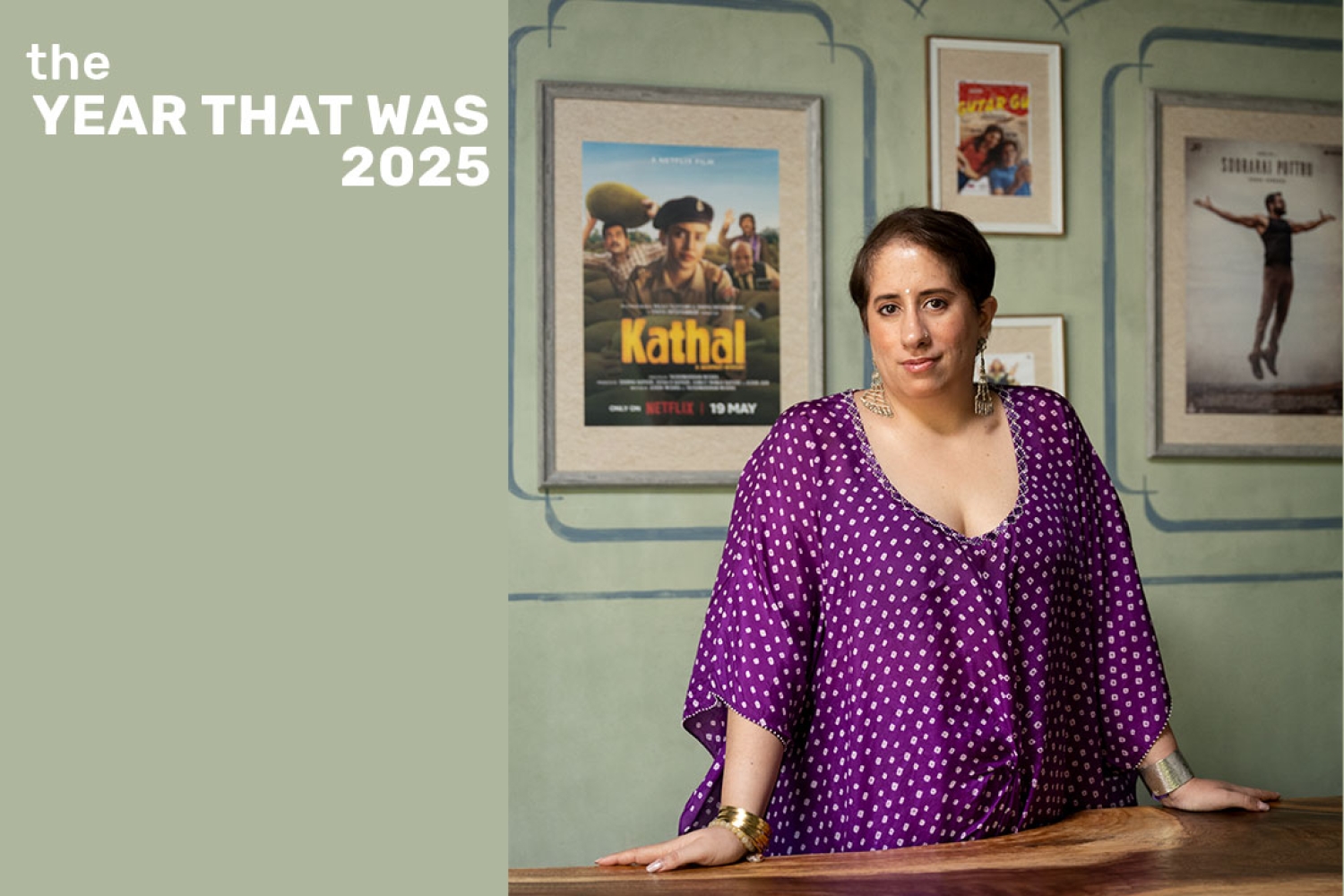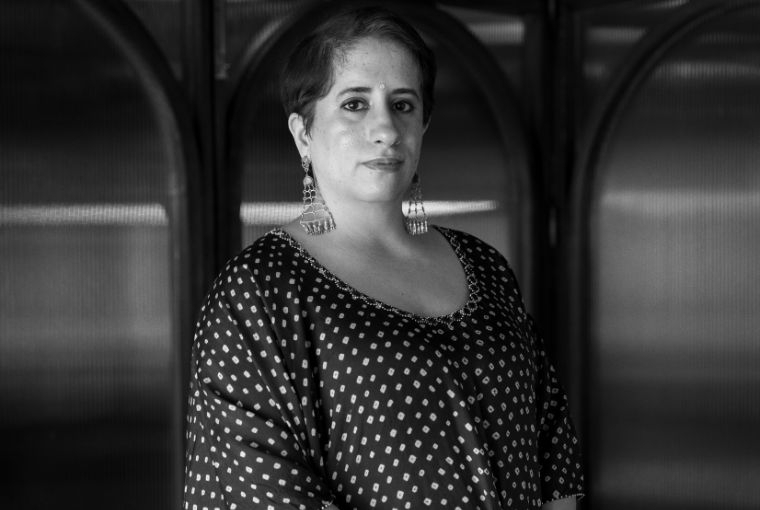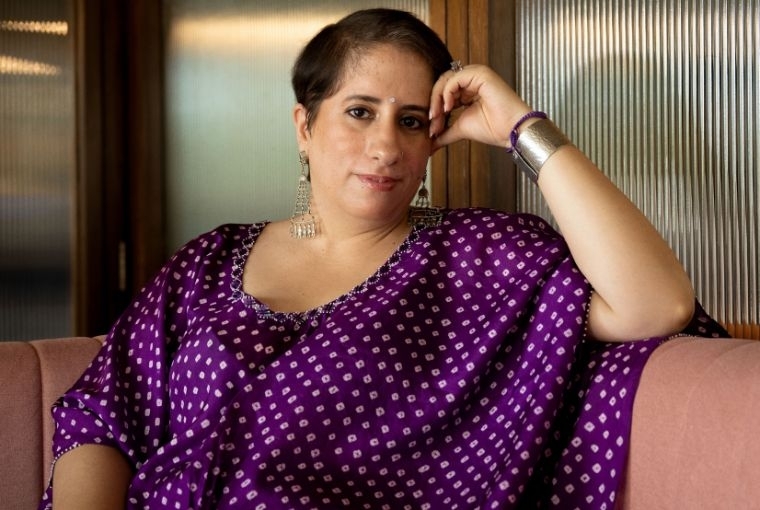
Photography Karan Kumar Sachdev

Photography Karan Kumar Sachdev
A conversation with the world-renowned, Academy Award-winning film producer, Guneet Monga Kapoor, feels like a masterclass in perseverance. Her resilience and unwavering belief in herself are nothing short of infectious. Perched gracefully on a bright geranium pink sofa in her Versova office, Guneet shares her extraordinary life story— that could easily be the script for a film. Yet, she has mastered the art of turning life’s challenges into triumphs. She tells us there’s no definitive blueprint for making a film a global success but she has found her own formula. Today she runs Sikhya Entertainment, one of the most successful production houses in India, with a repertoire that includes forty films, hundreds of shorts and even an Academy Award.
High on the successes yet deeply grounded, Guneet spent an afternoon with us, reliving her story and revealing her delicious little secrets of success.
From building a home for your parents to running Anurag Kashyap Films and starting Sikhya Entertainment to pursue your dreams, not many people are aware of your early beginnings. What lessons did you learn during that period?
Firstly, I am so happy to be here for Platform Magazine. The first ever cover of my life was for Platform, so it will always be extremely special for me. It was a decade or more ago and it meant a lot to me. So, thank you for following my career and being here today. It’s been a life of ups and downs. I started from a humble family and my parents’ biggest dream was simply to make a house. I feel very grateful to the universe that I was able to fulfil that dream when I was twenty two and buy them the house they wanted in Greater Kailash, right in front of a Gurudwara. Both my dad and I contributed but it was a lot of my hustle, grit and his unwavering support that empowered me to go ahead and make it happen. That was special, though unfortunately, none of us ended up living there.
That was a huge personal tragedy and I had to move to Bombay with everything— lock, stock and barrel. So, while the house was built and they got to see it, we just didn’t stay there. It was difficult.
Early on in Bombay, I tried to settle in, living with friends and finding a life here. I was lucky that some of my closest friends from college, who went on to persue post-graduation, while I was busy working, helped me transition. We lived together, including one of my dearest friends, Prerna Sehgal.
That’s when I met Anurag Kashyap, when he had just directed Dev. D and was looking for someone to run his company. We started working together and that gave me a purpose in life—to thrive, to see dreams, to have a community and to do just be engulfed with the idea of films in a deep way. It was healing, especially when you come out of a big loss. I worked very hard and put in the hours.
After a few years, that shape-shifted into something else and I picked up Sikhya Entertainment right after the film, Dasvidaniya.
But I didn’t look at it for almost a decade and then in 2017, we started again. We wanted to tell stories and whatever was in our power, we did everything for that and Sikhya came back to life.
I had to deal with a lot of abandonment and grief at the time. I felt a bit disillusioned. It has not always been rosy. The world sees one success after another, one film after another but it is very hard to make movies. It tests you and it takes a lot from you because you’re in the business of creative arts, the business of long format and the business of dreams. Somewhere in that, you pick yourself back up and tell yourself to keep going. That has been the mantra.
Now, when I look back and reflect at two decades of my life, I feel like I was a brave twenty year old who took such big decisions. You become smarter, wiser and maybe more scared. At that time, in your 20s, you don’t know your limits. You feel fearless. I am very proud of myself for coming out of huge personal losses and finding myself. Otherwise, those losses could’ve fully drowned me. Picking myself up and putting myself into movies was not easy.
I built a community here. Today, I stand humbled and proud of what we have built with Sikhya Entertainment and I have Platform back again in my office with my full team. I didn’t think life would pan out like that but I am grateful.

You are currently running one of India’s leading production houses, boasting an Oscar win and continuing to thrive. What is success and what is failure to you?
Having produced forty films and hundreds of shorts, some of them got nominated four times. Our movies have been to the Oscars, Cannes and the Toronto Film Festival multiple times. We have also explored international distribution but amidst all of this, we’ve never had a traditional, commercial hundred crore box office weekend. But is that what defines success for me? We’re thriving. We have three offices in Bombay and there is a solid team behind me that I am proud of. I could not do this alone. I could not do this without my producing partner, Achin [Jain], without the producers in my company—Raunaq [Bajaj], Manpreet [Bachhar] and Rakesh [Meel]—the whole team here. It takes a village to make a film. I pinch myself to believe in the wonderful team that we have built. All of that for me is success. You will be remembered for what you do and create rather than how much you make. And it’s not like we don’t want to be crushing the box office. Of course, we want to, and we will. But this is a hard industry to penetrate, especially for a producer because I don’t come from money. In India, producers are usually coming from money. But here I am. We find stories, fall in love with them, navigate them, go to an actor, find the money, execute them, make them, release them, market them, distribute them and expand the footprint of the IP.
Success for me is waking up inspired because then I will win the day, the week, the month and the year. And with all these stories that I am in love with, I will be able to take them forward, take the right path. But if we are not happy and not inspired, then we’re just spiralling. No matter the money. If you have a good story, then the money will find you. Largely, a producer is the most underrated and underestimated role in filmmaking. And I have made a career out of that. It’s falling in love with the story and the person who is going to tell that story. What one wants to do with that film and how far you can take it is more significant. Because then your film becomes more important. It defines pop culture. If you look at the ‘70s and ‘80s and look at the world, you talk about culture and the context of movies and that is why we are important as storytellers. All our time here is limited and in that limited time, what is the footprint that you would like to create? That is being inspired. That is success to me.
Failure, for me, is completely internal because it is not meeting the expectations that I have for myself and what I can do. Failure is not being able to live up to my own standards of success. If there are dreams I have for a particular movie and I want to take it far and put it on the world map and am not able to, I internalise that as my fault. I asked myself what else I could have done better.
Success is also standing up right after failure and keeping on going. Celebrating the ‘nos’, having the will to keep going—that is being successful.
What do you want to achieve on this journey now?
I think the idea from day one has been to put India on the map. We have an insane amount of talent in our country and the business of films allows us to thrive in India and then reach the diaspora. For me, the idea is to expand it further—not just to the diaspora but to the whole world, because, why not? If movies from around the world can travel—and this is the digital age, the age of Netflix and Amazon—then Indian stories can travel too. And that is my superpower. I’ve been on a journey—starting from a place of uncertainty, learning as I went and growing to understand how it all works. Today, I stand before you with the confidence to say that my superpower as a producer has emerged from this very journey. I feel I’ve just gotten started.
I’d love to make movies that have a global footprint. I’d love to make Indian films, irrespective of the language, that travel the whole world. That is a dream I’m manifesting, and the journey I’ve been on—be it The Lunchbox, Masaan, Gangs of Wasseypur, to Kill—learning every day, finding the partners. My curiosity as a producer is to constantly be able to make that bridge and do global cinema.
What was the vision you had for Sikhya Entertainment when you started and has it evolved in all these years?
Absolutely. Life happens, you learn more, you meet more people, you travel and your extensive exposure informs who you are. It allows you to make better decisions and expand your peer group.
As a producer, many of my peers are based in the US. The way they finance and operate has broadened my vocabulary on what I want to do and what I can achieve with a project—whether it’s a short, a documentary, or a series. We’re engaged in so many formats of storytelling. For example, The Elephant Whisperers was a short documentary and Yo Yo Honey Singh: Famous is a feature documentary. Then there’s Pagglait, Kathal and Soorarai Pottru, our Tamil feature film, which I’m so proud of.
And then there are shorts, starting with Kavi to now Anuja. It’s been a beautiful journey of growth and learning. When I started Sikhya, my sole purpose was to tell stories—stories that inspire, bring us closer, hold meaning, and stand the test of time. That vision has always been my driving force. Over time, I came to understand that stories don’t just travel; they also carry us with them, helping people who look like us find their place on a global stage. That realisation became significant to me. So yes, I aspired to contribute, even in a small but meaningful way, to making that a reality.
With all the knowledge that you’ve gained, what advice would you give to new producers and filmmakers on how to make their films stand out and achieve success? Is there a blueprint?
There is no blueprint. Except travel and go attend film festivals and learn; it allows you to grow. Film festivals are not just places for artistic films. Otherwise, a Gangs of Wasseypur or Kill would not have gone. Gangs of Wasseypur went to Cannes as a two-part mega film. So, I would say, travel. I would also say, please sign up for the producer’s course or the producer’s breakfast at Cannes. Learn more about how co-productions are done globally. Expand your knowledge; that is at the core of it. I was able to do it and I feel anybody can do it. The road map is out there. There’s Sundance, Berlin, Cannes, Toronto, Locarno, Venice, Shanghai, Busan Film Festival, Japan Film Festival, Kerala, Dharamshala and Goa. Programmers attend these festivals and there are so many meeting spots. I had some of my best connections at the Zurich Film Festival and was amazed by the master classes I attended at the British Film Festival. Even if you can’t travel internationally, travel within India. I’ve hired people from the Dharamshala Film Festival. You get to build a community, be part of a community and understand what’s happening around the world. That keeps us grounded, keeps us alive and allows us to dream. Everywhere, there is commercial film pressure, in both the US and India. Other countries, however, often offer more grants. There are grants and tax rebates but that’s just the logistics of producing. Still, everybody aims to set themselves up for success. Be it reviews, selections, box office numbers or anything else. That can only happen when you have exposure.
You’ve had the chance to understand how the world looks at Indian cinema. What is working for us and what can we work upon?
I think being at the Sundance Film Festival has helped India Cinema immensely. In the last five years, we’ve been winning. Every year, an Indian film has been winning at Sundance. Be it Girls will be Girls, this year’s Sabar Bonda. Before that, it was Writing with Fire. It was also Shaunak Sen’s All That Breathes. The world is curious about India. It’s not easy to be on a global stage and win at a global film festival. That defines the journey a film could have. We are many languages put together. In the world of cinema, there’s Tamil, Telugu, Hindi, Marathi, Punjabi, Gujarati, Bengali, Bhojpuri and Malayalam. Each of them has its syntax and its colour and they are breaking out in their territories. The world is excited about India because the world looks at India and thinks, ‘Oh my God, there are so many people and films’. We are everything, everywhere, all at once. We do beautiful documentaries; we do big commercial films with a huge footprint and we do soul-stirring movies that matter. I think India has just got started. But I do think that producing is at the centre of it. How to capture the imagination of the world, has producing at the centre of it. That is why I feel like this profession is underestimated. Because distribution defines the impact of the film. An idea is free. The magic lies in the execution—how and what are the best ways to execute it? How do you distribute it? How do you distribute it to a global audience so that you matter in pop culture as well? Producing does form the centre of it. If The Lunchbox had only been sold in India, downstream to the rest of the world, it would never have become the film it is today. That’s what understanding a film’s potential and striving to set it up for success is all about. That is the core of it. I believe working with the West, in their language and on their terms, plays a crucial role. And that, to me, is the essence of producing.

It is very refreshing to see how grounded you are, the values you share, your positivity and your love for your family. How do you nurture that?
I’ve spent the last two decades articulating grief. Grief is my best friend. In every moment of success, I miss my parents. I miss their eyes and their outlook on what is happening in my life. To shine under the sun and not be able to share that with your people is a grief you carry. And that humbles you. It makes you grateful for everything that is because life, connections and people are precious. People make an organisation. Success and failure are incidental. They’re transactional. Some things work. Some things hit it out of the park. Some things don’t work. But how we show up for ourselves and our people, matters every day. Like I said, when you go, it will not be about what you did, but how you made people feel. I’m very grateful to now have found a family after not having a family for a decade and a half or more. Two years ago, I got married. I am overjoyed to have a set of parents. And I’m obsessed with them.
You can see that heavily on my Instagram. I don’t think I should do anything besides spend every moment of my life with them. I am grateful for the access I’ve been able to build for myself and my company. I’m raring to go and do more. I have a deep spiritual practice, which is just Gurbani. It allows me to stay centred, be grateful, be humbled and appreciate the time that the sun shines on us. And when it’s raining, it allows us to stay grounded. I feel spiritual about the work I do.
I feel stories choose us. I’m not the one who would say that I knew what we were doing because we figured it out.
We ask the questions. We explore. We hustle. And magic happens. Oscars happen. I am so grateful for all of that. Grateful for the doors opening for us. There’s no time for ego. I’m deeply curious. There’s so much to learn. I’m just grateful for having a family, a loving husband and my parents now. And, yes, this is life and I want to live it to the fullest.
Guneet Monga Kapoor recently received the Best Hindi Film award for Kathal at the 71st National Film Awards. This conversation is a part of our May 2025 Bookazine; for more such stories grab your copy here.
Words Hansika Lohani
Date 2-08-2025